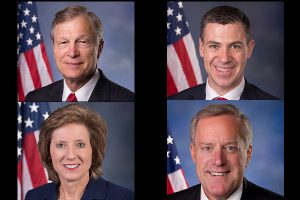Lawmakers Call on Attorney General to Go After “Obscene Pornography”
 We all know that the current Republican party has a problem with pornography. They’ve passed resolutions in 15 state legislators over the past three years calling adult entertainment a “public health crisis” and riling up their constituencies to fear and detest smut. But now, four Republican members of congress— Jim Banks of Indiana, Mark Meadows of North Carolina, Vicky Hartzler of Missouri, and Brian Babin of Texas — have upped the ante.
We all know that the current Republican party has a problem with pornography. They’ve passed resolutions in 15 state legislators over the past three years calling adult entertainment a “public health crisis” and riling up their constituencies to fear and detest smut. But now, four Republican members of congress— Jim Banks of Indiana, Mark Meadows of North Carolina, Vicky Hartzler of Missouri, and Brian Babin of Texas — have upped the ante.
Late last week, they sent a letter to Attorney General William Barr, pleading that he spur the Department of Justice to take action against producers and distributors of what they call “obscene pornography” — a term that they do not bother to define anywhere in their letter. As might be thus expected, the letter goes on to egregiously conflate heinous crimes with legal adult entertainment. It also ignorantly lambasts a legal industry instead of carefully looking at how to combat criminal enterprises.
To wit: “The Internet and other evolving technologies are fueling the explosion of obscene pornography by making it more accessible and visceral,” the representatives wrote. “This explosion in pornography coincides with an increase in violence towards women and an increase in the volume of human trafficking as well as child pornography.”
I’d like to stop here for a moment to note the blatant errors in facts and logic in the above paragraph: For one thing, human trafficking and child sexual abuse are not the same as pornography. Lumping them together is fallacious, irresponsible, and dangerous.
Secondly, the representatives are smart enough to note that evolving technology and the internet have contributed to the rise of pornography online. Great! That’s true. But they then blame an uptick in dastardly crime on the “explosion” of pornography, instead of the same evolving technology that allows a perfectly legal business to thrive on the internet.
Let’s think about this, shall we? Consensual, legal, adult entertainment is becoming more accessible because more people are more able to film it, distribute it, and watch it online. Because filming, distribution, and consumption of media are becoming easier online. Thus, the uptick in any other industry — legal or illegal — that involves filming, distributing, and watching should clearly be attributed to the same evolving technology.
But instead of putting 2 and 2 together to get 4, the representatives did some kind of advanced moralizing calculus that resulted in the following mess of failed logic: “Victims are not limited to those directly exploited, however, and include society writ large. This phenomenon is especially harmful to youth, who are being exposed to obscene pornography at exponentially younger ages.”
The letter did not make it clear how these lawmakers think that children seeing pornography online at early ages is linked to sex trafficking and child sexual abuse. Probably because they didn’t think about it — they just let their knees jerk to a reaction that lumps together a lucrative, legal, safe, and consensual industry (porn) with heinous crimes committed against vulnerable people the world over (human trafficking and child sexual abuse). Cool, cool. (Also, here’s a quick side note to state that “younger ages” do not work “exponentially.” The math there is just… Well, it’s not even math.)
These brilliant legislative minds continued in their letter, “Given the pervasiveness of obscenity it’s our recommendation that you declare the prosecution of obscene pornography a criminal justice priority and urge your U.S. attorneys to bring prosecutions against the major producers and distributors of such material.”
The representatives also reminded Attorney General Barr that, before his election in 2016, Donald Trump signed a pledge. “The pledge says that if Trump [was] elected as president he would uphold the rule of law by aggressively enforce existing federal laws to prevent the sexual exploitation of children online, including the federal obscenity laws, child pornography laws, sexual predation laws, and the sex trafficking laws. The lawmakers asked Barr to fulfill Trump’s campaign promise,” wrote Janite Kan at the Epoch Times.
They’re also calling upon what they hoped would Barr would do the moment he was appointed as Attorney General: go after the pornographers. During his stint as attorney general under President George H.W. Bush, wrote Alexandra DeSanctis at the National Review, “Barr focused on prosecuting obscenity cases in the early 1990s…and, as they put it, ‘dramatically decreased child pornography in America.’”
Sure, folks. By all means, please protect kids and other vulnerable individuals from being victimized by the criminals who prey upon them! But can we do it without implicating innocent people who work safely and legally in adult entertainment? That’d be great.













